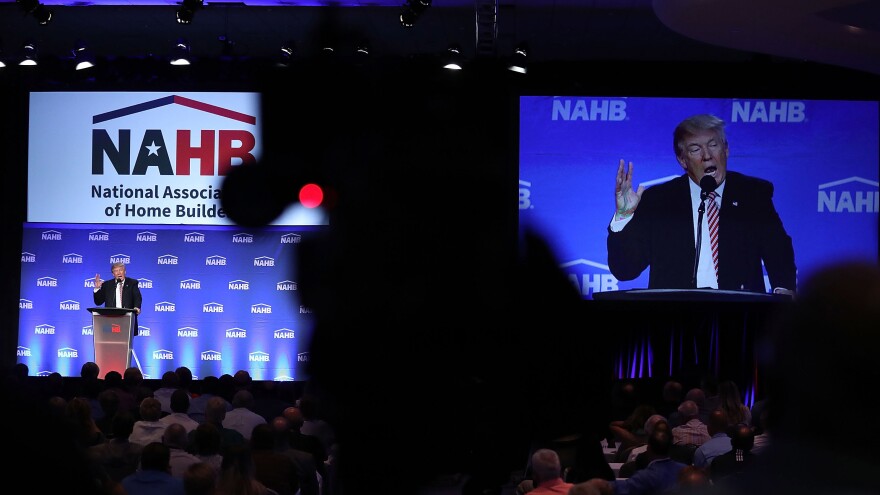Updated at 9:40 a.m. ET
Republican presidential nominee Donald Trump's campaign will begin airing its first television ads of the general election in the coming days, the campaign confirms to NPR.

The ads will air in Florida, Pennsylvania, Ohio, Nevada and North Carolina — all key battleground states where Democratic nominee Hillary Clinton has taken leads or grown her leads in recent polls. It was not immediately known how much the Trump campaign would spend in this initial ad buy.
Trump has insisted that he does not need to run traditional TV ads, given the attention he gets from free media coverage and his reach on social media.
"I don't even know why I need so much money," Trump said at a campaign rally in Maine back in June. "I go around, I make speeches, I talk to reporters. I don't even need commercials, if you want to know the truth."
But as he has fallen perilously behind Clinton since the conventions, amid weeks of controversy that have brought negative attention from the media, Republicans have implored Trump's campaign to change course. "I'd like to see Donald Trump spend a day, two days, five days, seven days, two weeks without any gaffe, without any errors, without attacking people on Twitter, without going after Gold Star Families," GOP strategist Ron Christie told NPR this week.
The latest available figures show a massive spending lead by Clinton and her allies. According to numbers from Advertising Analytics reported by NBC News, the Clinton campaign has spent $61 million so far on TV ads, with another $43 million from pro-Clinton outside groups. Recently, the pro-Clinton superPAC Priorities USA announced that it was putting a pause on TV advertising in the states of Virginia and Colorado, an act of confidence that Clinton is well-positioned to win those states.
By comparison, the Trump campaign has spent $0 so far on TV ads, with outside groups spending $12.4 million in support of Trump, according to Advertising Analytics/NBC News. Those groups include the National Rifle Association and Great America PAC, run by veteran GOP strategist Ed Rollins.
The Trump campaign also started aggressively raising money fairly late. Trump raised $80 million in July, with joint efforts between his campaign and the Republican National Committee, ending the month with $37 million in the bank. The Clinton campaign and Democratic party together raised about $90 million in the same month. In June, Trump raised just over $50 million with the RNC, compared to $68.5 million for the Clinton/DNC efforts.
In addition to Trump's adoption of major fundraising in recent months and now TV advertising, he has also appeared more like a traditional candidate on the campaign trail this week. Trump delivered a scripted policy speech on fighting terrorism on Monday. He has done several similar policy speeches since securing the Republican nomination, only to quickly go off script at rallies and find himself back in controversy.
Trump appeared Tuesday night at what seemed to be a setting for a more typical rally in West Bend, Wisc., but he mostly stuck to the script in what the campaign billed as a speech on "law and order," in which he talked about violence in cities, along with common themes about what the GOP nominee views as a "rigged" political system.
The question is whether Trump can overcome a growing deficit with less than 90 days before election day, and even less than that before some key states begin early voting. The latest NPR analysis of the battleground map shows Clinton in a strong position, with enough electoral votes to secure the presidency — if the election were held today and the polls were to hold — without carrying any states considered toss-ups.
Copyright 2021 NPR. To see more, visit https://www.npr.org.




